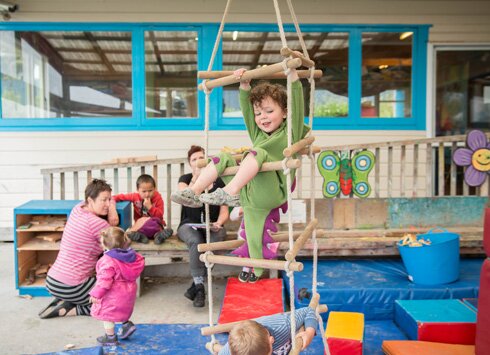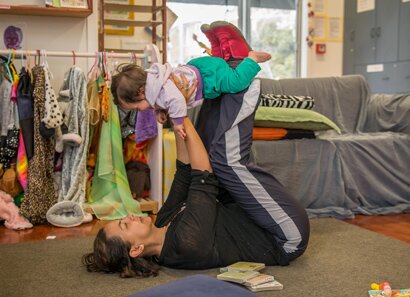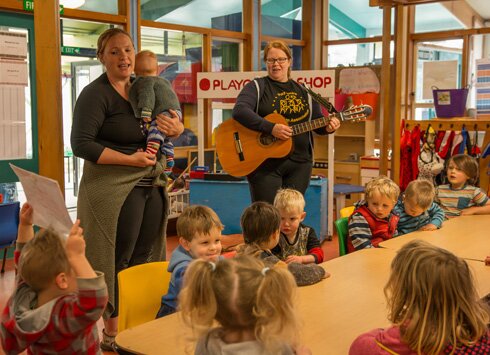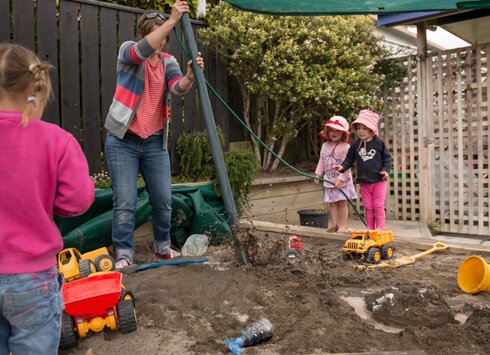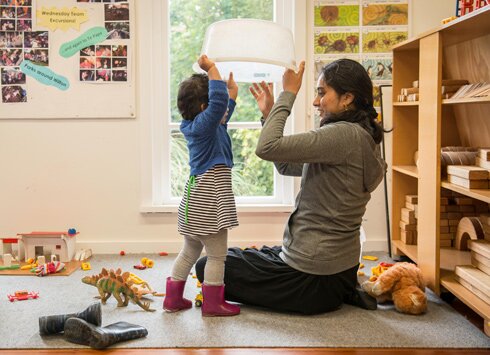About Playcentre
The original, innovative philosophy based on child-initiated play and the important of parents as the first and best educators of their own tamariki, is still as important today as it was when Playcentre was founded in 1941.
With this belief very strongly at the core of our co-operative, Playcentre families receive a unique early childhood experience with opportunities for whānau and tamariki to learn together.
Parents and whānau work together to provide an early childhood learning environment where the tamariki (children) make discoveries through play. Playcentre children and adults support each other at and outside Playcentre to form a strong community network.
“Playcentre is a huge part of our lives. Eddie loves it of course, so do I. I couldn’t imagine ‘doing’ early childhood education any other way… When my husband was asked: ‘if people could do just one thing to make children’s lives better, what would it be?’ He said, ‘Playcentre’. I feel very lucky to be able to ‘do’ Playcentre and wish that everybody could; the world really would be a better place.”
Juliet Dewhirst, past president Otaki Playcentre
We invite you to visit your local centre to see if Playcentre is right for your family.
Playcentre sessions.
As well as being led by parents, other distinguishing points about Playcentre sessions are:
- Mixed age sessions: They cater for all ages – most sessions have a range of tamariki from birth to school age (up to six years) attending.
- High adult to child ratios: There is a high adult-child ratio on Playcentre sessions, one adult to five or fewer children.
- Sessional: They are sessional – running for 2½ - 4 hours, usually in the morning.
It is often remarked by school teachers that Playcentre children are very confident when relating to other children and adults. They are often the first to ask for, or to volunteer information. Their ability to relate to people of all ages, and thirst for knowledge of the world around them, stands them in good stead in the wider world.
Child-initiated play
At Playcentre we believe that the play of our tamariki is their work. Play allows tamariki to learn about the world and make sense of their place in it. The word ‘play’ is very broadly defined. It encompasses tamariki using all the senses to see, hear, touch, taste and smell the world around them.
Playcentre provides an environment which allows a wide range of learning experiences for all ages or developmental stages. It provides the opportunity for your tamariki to choose an activity or develop one for themselves.
At Playcentre they can complete their work to their own satisfaction, instead of having to follow a strict timetable, as is often the case at home and in society generally.
Adults have input into the play through planning, setting up activities, and involvement alongside the tamariki as they play.
Benefits of mixed age sessions
There are many benefits of having a range of ages of preschool children on each session, and this reflects the tuakana/teina (learner/teacher) concept within the whānau:
- It enables younger tamariki to learn from older ones, and in turn, gives older ones the opportunity to be leaders and care-givers. The older tamariki extend the play of younger ones and learn to be tolerant and nurturing.
- Younger tamariki can experience more complex play than with their same-aged mates.
- Parents can bring all preschoolers of various ages to one session creating a shared experience.
- Adults learn by working with tamariki who are at different ages and stages than their own.
- Tamariki can mix with others of similar ability and interests regardless of age.
“It is ‘absolutely wrong’ to assume children learn at the same time and at the same pace. It’s against life and it’s against nature. ... Your structure at Playcentre is the best because you’ve got all ages from birth to school age. Children learn from each other much more than they will learn from you (adults). Parents/whānau running sessions means children are looked after and learn from adults they know, who know them well, and who are part of their community. It takes a whole village to raise a child. It’s good to have lots of mothers and lots of fathers.”
Dick Grace, Kaumatua of Hongoeka Marae (Plimmerton, Porirua), and former primary school principal
Benefits of high adult: child ratios
Playcentre has one duty adult on the session for every 5 (or fewer) children and often ratios are even higher. This contrasts with other early childhood options which have ratios of up to 1:10.
We aim to keep the number of adults on a session high, because educational researchers have found that having an adult helper is important for children’s play.
Children need adults who offer comfort and challenge, who respond readily to the child’s ideas; know them well enough to work out what they’re attempting; and who will help them learn how to get along with their playmates.
Through this adult contact, tamariki learn to gain trust and develop relationships with a wide range of adults. These many interactions help develop communication skills and language. It also ensures more adults are available to extend children and help them to become self-motivated learners.
The wide range of skills, past careers and experiences that Playcentre adults bring to sessions helps to develop unique programmes and activities around the interests of tamariki.
Adult education
For parents choosing an early childhood option, often one of the most compelling distinctions of Playcentre is the free parent education programme. The reason for running parent education courses are twofold:
- They help us to grow as parents by providing valuable parenting knowledge and skills
- The Ministry of Education requires people with certain levels of training on each session for Playcentres to receive funding.
Playcentre education is very practical. The adult education courses are facilitated discussions with other Playcentre members. They provide ideas and learning that can be applied at home as well as at Playcentre, and also help new families get to know each other.
For many parents, adult education gives them confidence not only in their parenting abilities, but also in their ability to learn and contribute to their community. Many Playcentre parents go on after Playcentre to study further. Others make huge contributions on school boards, sports clubs, Guides, and at local and central government levels.
How Playcentre is run
Playcentres are co-operatively managed and supervised by parents. As a co-operative, each whānau has a voice and everyone has a sense of ownership and vested interest in the success of their centre. Group decisions are made by consensus, a process that supports the co-operative nature of Playcentre.
There is an expectation that each whānau takes on a specific role to help run the centre, such as president, treasurer, garden supervisor, bicultural officer or area of play caretaker.
Playcentres receive funding from the Ministry of Education through bulk funding and ongoing training grants, but individual centres will often seek small donations each term and input into fundraising activities to help maintain equipment and cover administration costs.
Most centres have opted into the Government’s 20 Hours Early Childhood Education scheme. More detailed information about how this affects the fees/donations asked for by your centre will be given to you when you visit your local Playcentre.
Playcentre acknowledges Te Tiriti o Waitangi (The Treaty of Waitangi) as the founding document of Aotearoa New Zealand. We are working towards providing an environment at Playcentre which reflects the dual heritage (Māori and Pakeha) of Aotearoa New Zealand for our tamariki while recognising the strengths and diversity our multi-cultural society provides.



